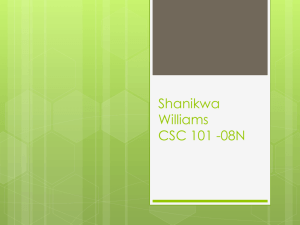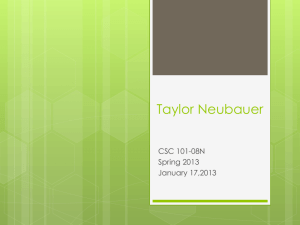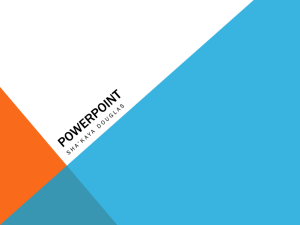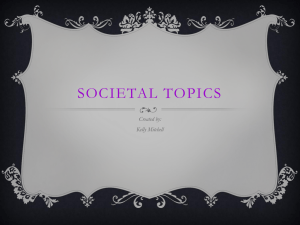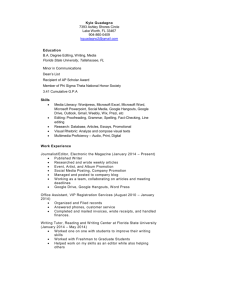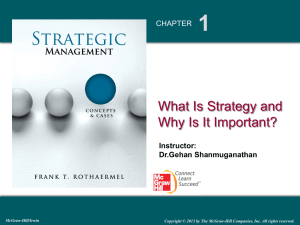CSC-100-08N Kristie Vitulli
advertisement
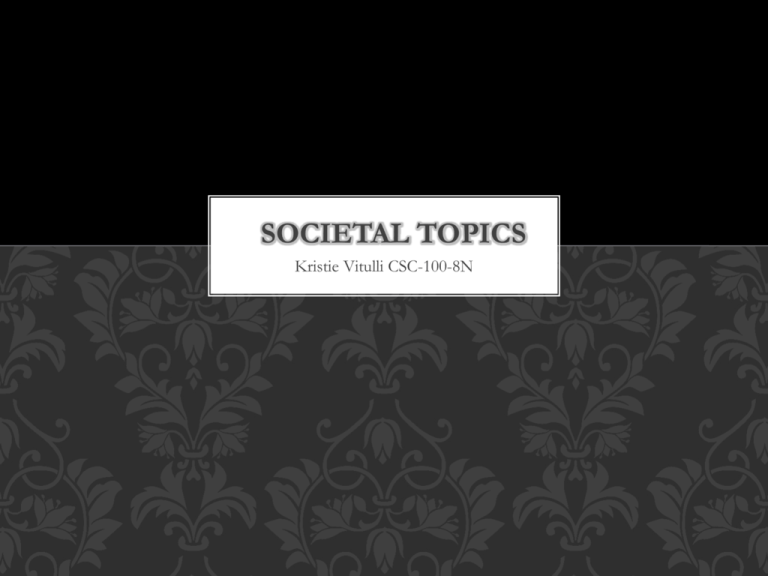
SOCIETAL TOPICS Kristie Vitulli CSC-100-8N WEEK 1-SHOWROOMING • Showrooming is when a customer goes to a store to look at a product, then purchases the item online, usually for a lower price. • 50% percent of online sales are driven by showrooming and luxury items. • Consumer electronics are the most commonly showroomed products. WEEK 1- HOW I LEARN BEST • Hands on activities are how I learn best. I am a visual learner, so I retain information better when I am given something to look at, rather than listening to a concept. WEEK 2- HOW CAN YOU PREVENT DIGITAL WILDFIRES? • Social media can rapidly spread information that is either intentionally or unintentionally misleading or provocative. • What could be done to protect against the risk of digital wildfires? Many jurisdictions already have laws that limit freedom of speech in the real world for reasons such as incitement of violence or panic, and are grappling with how to apply those laws to online activities. • Build internet firewalls to prevent digital wildfires from occurring. Only the users of the internet users can do this! WEEK 2- MOOC • MOOC or“Massive Open Online Course” that anyone with an Internet connection can attend for free. • MOOCs typically do not offer credits awarded to paying students at schools. However, assessment of learning may be done for certification. • Participants do not need to be a registered student in a school to "take" a MOOC, and are not required to pay a fee. • MOOCs can also serve as a potential networking hub for people interested in the topic of the courses being taught. WEEK 3- INNOVATION • The process of translating an idea or invention into a good or service that creates value or for which customers will pay. • To be called an innovation, an idea must be replicable at an economicalcost and must satisfy a specific need. • involves deliberate application of information, imagination and initiative in deriving greater or different values from resources, and includes all processes by which new ideas are generated and converted into useful products. WEEK 3- INTELLECTUAL PROPERTY • Intellectual property (IP) refers to creations of the mind: inventions, literary and artistic works, and symbols, names, images, and designs used in commerce. • IP is divided into two categories: Industrial property, which includes inventions, trademarks, industrial designs, and geographic indications of source; and Copyright, works such as novels, poems and plays, films, musical works, artistic works such as drawings, paintings, photographs and sculptures, and architectural designs. • Rights related to copyright include those of performing artists in their performances, producers of phonograms in their recordings, and those of broadcasters in their radio and television programs WEEK 4- COPYRIGHT, OPEN SOURCE SOFTWARE, EPIC YNHC Societal Topics Week 4 Double Tweet WEEK5-OPEN SOURCE TEXTBOOKS • An open textbook is a textbook licensed under an open copyright license, and made available online to be freely used by students, teachers and members of the public. • Many open textbooks are distributed in other printed, e-book, or audio formats that m • Overall, open textbooks have been found by the Student PIRGs to offer 80% or more savings to higher education students over traditional textbook publishers. WEEK5-ACCESS • Microsoft Access is the database application from the Microsoft Office Suite of applications. It is a powerful personal database and data manipulation tool that is also widely used in many small businesses. • A communications program from Microsoft, meant to compete with ProComm and other programs. It sucked and was dropped. Years later they reused the name for their database. • Access tables support a variety of standard field types, indices, and referential integrity WEEK6-HUMAN RIGHTS • Microsoft recognizes that as a leading technology provider with global operations, our business can help to promote human rights. • Our approach to human rights is aligned with the UN Guiding Principles for Business and Human Rights. • We accept the important responsibility we have to respect human rights and we aid to bring the power of technology to bear to promote respect for human rights throughout the world. WEEK6-JQUERY MOBILE • A unified, HTML5-based user interface system for all popular mobile device platforms, built on the rock-solid jQuery and jQuery UI foundation. • Its lightweight code is built with progressive enhancement, and has a flexible, easy design. • Some examples are listed below WEEK7-INTERNET GOVERNANCE • Internet governance is the development and application of shared principles, norms, rules, decision-making procedures, and programs that shape the evolution and use of the Internet. WEEK7-GOOGLE APPLICATIONS • Google Apps is a suite of Google applications that brings together essential services to help your business. • This is a hosted service that lets businesses, schools, and institutions use a variety of Google products • includes Email, Google Docs, Google Calendar, and Google Talk -- on a unique domain WEEK8-GEOLOCATION • Geolocation is the identification of the real-world geographic location of an object, such as a radar, mobile phone or an internetconnected computer terminal. Geolocation may refer to the practice of assessing the location, or to the actual assessed location rather than geographic coordinates. WEEK8-NET NEUTRALITY • When we log onto the Internet, we take lots of things for granted. We assume that we'll be able to access whatever Web site we want, whenever we want to go there. • What makes all these assumptions possible is "Network Neutrality," the guiding principle that preserves the free and open Internet. • Net Neutrality means that Internet service providers may not discriminate between different kinds of content and applications online. • It guarantees a level playing field for all Web sites and Internet technologies. WEEK9-SPAM • Spam is the use of electronic messaging systems to send bulk messages, mostly advertising, indiscriminately. • While the most widely recognized form of spam is e-mail spam, the term is applied to similar abuses in other media. WEEK9-OFFICE LIVE • Microsoft Office Live is a discontinued web-based service providing document sharing and website creation tools for consumers and small businesses. • Office Live consisted of two services, Office Live Workspace, which was superseded by SkyDrive, and Office Live Small Business, which was superseded by Office 365. WEEK10-SECURITY • Many web developers consider security a low priority. Security is frequently relegated to the end of the software development life cycle, as little more than an afterthought. Sometimes, software security is neglected entirely, resulting in applications rife with common vulnerabilities. • Because such bugs might manifest only under conditions present during an attack, they can be hard to detect prior to such events without knowledge of how the exploitation process works. • Using a web application built with jQuery Mobile, PHP, and MySQL, this tutorial shows how many types of vulnerabilities occur along with common methods of exploitation and, most importantly, their respective countermeasures WEEK10-STANDARDIZATION • In jQuery Mobile, you can use existing and new HTML5 input types such as password, email, tel, number, and more. Some type values are rendered differently across browsers — for example, Chrome displays the range input renders as a slider — so we standardize their appearance by dynamically changing their type to text (currently, this applies to range and search). You can configure which input types are degraded to text with the page plugin's options. • One major advantage of using these more specific input types if that on mobile devices, specialized keyboards that speed data entry are offered in place of the standard text keyboard. Try the following inputs on a mobile device to see which display custom keyboards on various platforms. WEEK12-ZILLOW.COM • Zillow is an online real estate database that was founded in 2005 by Rich Barton and Lloyd Frink, former Microsoft executives and founders of Microsoft spin-off Expedia. WEEK12-PRIVACY • Internet privacy involves the right or mandate of personal privacy concerning the storing, repurposing, providing to third-parties, and displaying of information pertaining to oneself via the Internet. Privacy can entail either Personally Identifying Information (PII) or non-PII information such as a site visitor's behavior on a website. • PII refers to any information that can be used to identify an individual. For example, age and physical address alone could identify who an individual is without explicitly disclosing their name, as these two factors are unique enough to typically identify a specific person. WEEK13-IPHONE 5S • is a touchscreen-based smartphone developed by Apple Inc. • It is the sixth generation of the iPhone and succeeds the iPhone 4S. WEEK13-INSTAGROK.COM • Online research and learning tool that allows users to search for educational content and visualize relationships with materials of related topics WEEK14-ESSAY GRADING SOFTWARE • This software will take a 100 of the professors already graded essay’s and compare the rest using a new software. The grading is based on technique, grammar, spelling, and plagiarism. • Although proven useful, most professors do not trust it because language is an interpretation of thought and emotion, and a machine is not capable of either thought nor emotion. WEEK 14-USHAHIDI • Ushahidi is an open source project which allows users to crowd source crisis information to be sent via mobile. It is intended for sending information for collection, interaction, and visualization purposes and makes communication easier.
